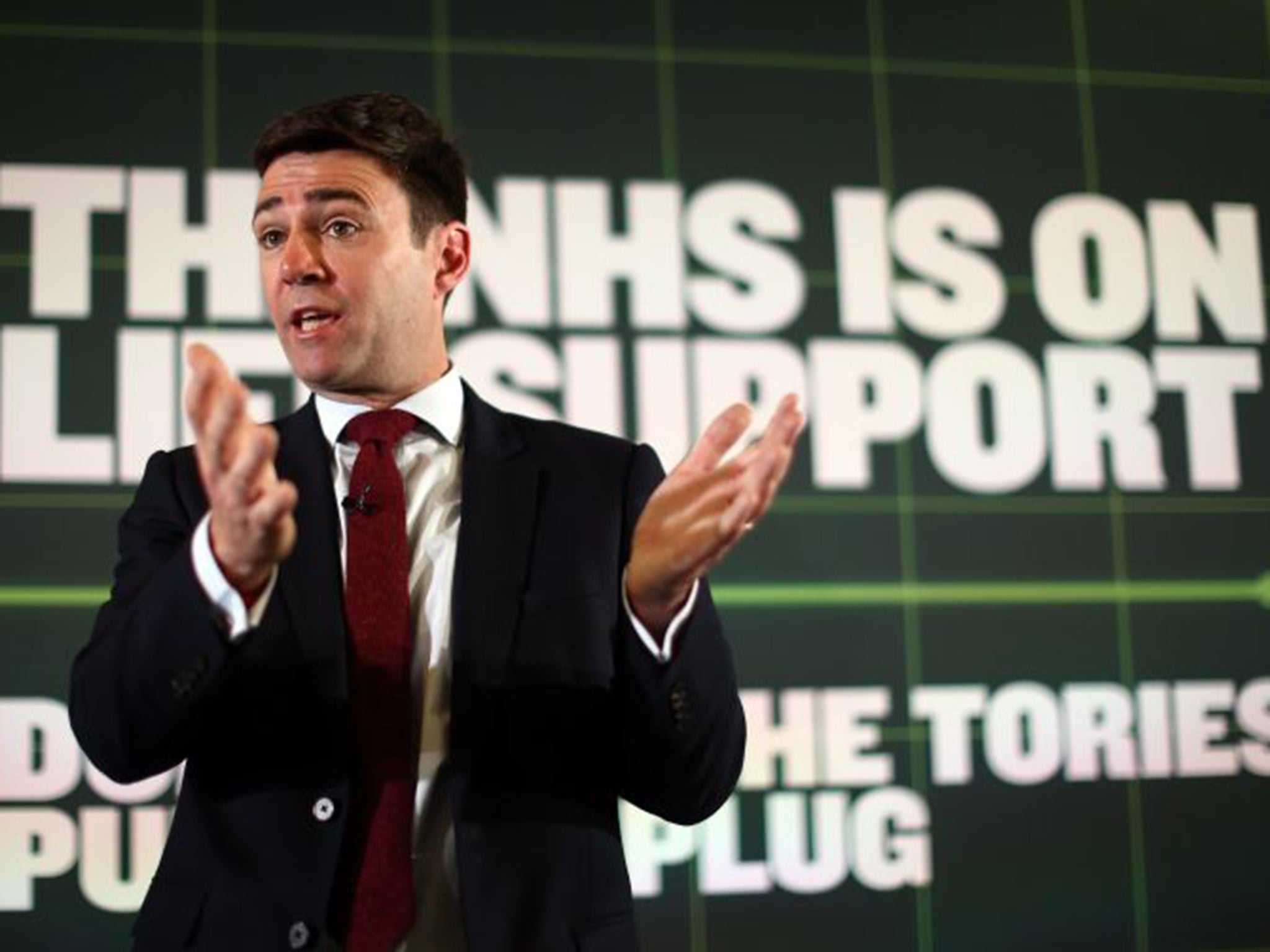Profit motive is ‘ripping through the NHS’, Andy Burnham warns
As income from paying patients grows, Labour says the service will crumble under the Tories

The UK’s first privately run NHS hospital more than doubled its income from patients paying for an enhanced service, new figures have revealed.
Hinchingbrooke Hospital, which until January was managed by the private company Circle Health, made £1.15m in 2014-15 from charging patients, most of whom were treated in its seven-bed private unit, which offers individual rooms, better food, and Sky TV.
Many NHS hospitals have also begun offering extra “private patient” services since the coalition lifted the previous 2 per cent cap on the income they can earn from such activities. Last year, income from private patients represented 0.9 per cent of the NHS foundation trusts’ income.
National figures for 2014-15 are not yet available, but Freedom of Information requests from a sample of 17 NHS hospitals show a net increase of £3.4m in income from private patients in the year to April, with one Merseyside hospital bringing in £2m after taking over a previously privately run facility.
Paying patients go on to a different waiting list for elective procedures such as knee operations and cataract surgery, and get a quicker, often more luxurious, experience. Hospitals that offer paid-for services insist that they do not draw resources or manpower away from non-paying patients.
However, Labour has said the decision to allow hospitals to make up to 49 per cent of their total income from private patients risked the creation of a “two-tier system” that would run counter to the NHS’s founding principles.
Ed Miliband and Labour’s health spokesman, Andy Burnham, have pledged to reintroduce the 2 per cent cap that existed before the coalition’s controversial Health and Social Care Act reforms of 2012.
However, the Conservatives have countered by pointing out that private-patient income has fallen as a proportion of hospital budgets, and peaked under Labour in 2005-06.
Hinchingbrooke Hospital in Huntingdon, Cambridgeshire, is now back in NHS hands after Circle dramatically withdrew from their contract earlier this year, citing “unprecedented” funding cuts and increasing demand at A&E. The announcement in January came only hours before the publication of a damning inspector’s report. The Care Quality Commission has since upgraded the hospital from “inadequate” to “requires improvement”, but it remains in special measures.
Private-patient income at the hospital increased from £439,676 in 2013-14 to £1,150,697 in 2014-15.
Circle was contracted to run Hinchingbrooke in 2011, the first time a private company had taken over an NHS hospital, in a radical attempt to improve efficiency and manage debts which had run up to £40m.
However, despite bringing down costs and increasing income from private patients, Hinchingbrooke Healthcare NHS Trust reported a £14m deficit last week, far higher than predicted.
Circle’s losses for the contract were capped at £5m, with the taxpayer liable for remainder of the trust’s deficit.
The increasing strain on NHS resources
Show all 4Hospitals vary significantly in the range of private services they offer. Many hospitals do not offer any, and in most they represent less than 1 per cent of total income. However, many are increasing paid-for activities. Aintree University Hospital NHS Foundation Trust, which previously had offered no paid-for services, brought in £2,008,000 in 2014-15 after taking over the Sefton Suite, which had previously been operated by private companies.
A small number of hospitals bring in larger sums from paying patients, often from overseas. The world-leading Royal Marsden cancer centre in London, for example, made £63m in 2013-14 from private patients – a quarter of its total income.
Labour has said some hospitals would be exempt from the 2 per cent cap if they can show they are meeting waiting times and bed occupancy targets for NHS patients.
Mr Burnham said the new figures showed a “changing” NHS.
“The profit motive is ripping through the NHS – it cannot survive another five years of the Tories,” he said. “We will repeal David Cameron’s privatisation plans and put patients first.”
A spokesperson for Circle said: “Hinchingbrooke has had a private patient unit since 1994, but it’s never been big. It’s just seven beds and last year it made about 1 per cent of the trust’s income. This is in line with most other hospitals of its size.”
A spokesperson for Aintree Hospital said: “Consultants can only deliver privately funded work outside of their contracted NHS hours and the Sefton Suite’s facilities and support staff are separate from the NHS, so this service does not affect the Trust’s ability to deliver NHS services in any way.”
A spokesperson for Hinchingbrooke Healthcare NHS Trust said: "Private treatment at Hinchingbrooke only accounts for around 1% of our income and brings in additional investment for our NHS patients. Our main focus for reducing the trust’s deficit is on recruiting permanent staff to reduce interim and agency staff costs and being as efficient as possible in the way we run our hospital.
"We are also working closely with NHS colleagues and other partners across East Anglia to identify how we manage the big issue of demand and capacity across the region, which has a major impact on our finances.
"It is correct that the price private patients pay includes having the same menu and food as our NHS patients. Private patients can choose to pay extra for an enhanced menu if they wish on top of this."
Subscribe to Independent Premium to bookmark this article
Want to bookmark your favourite articles and stories to read or reference later? Start your Independent Premium subscription today.

Join our commenting forum
Join thought-provoking conversations, follow other Independent readers and see their replies